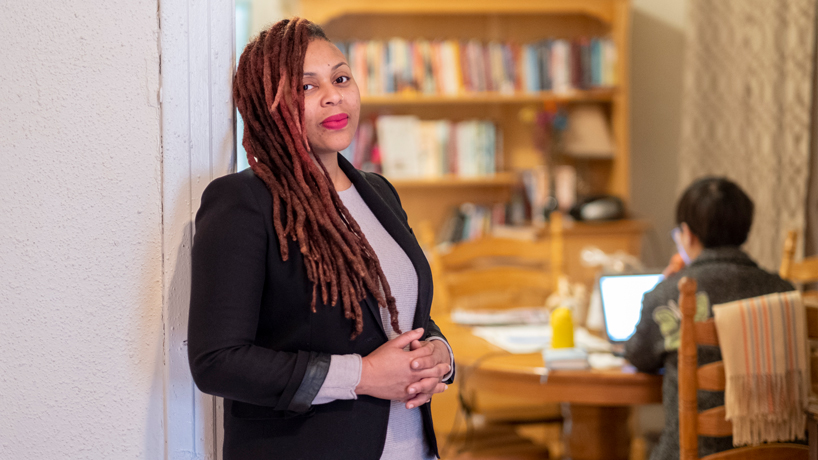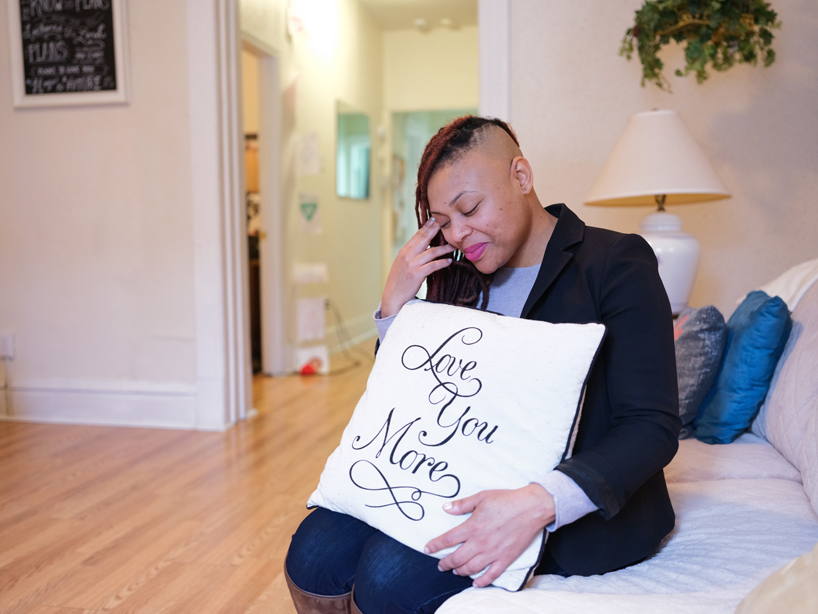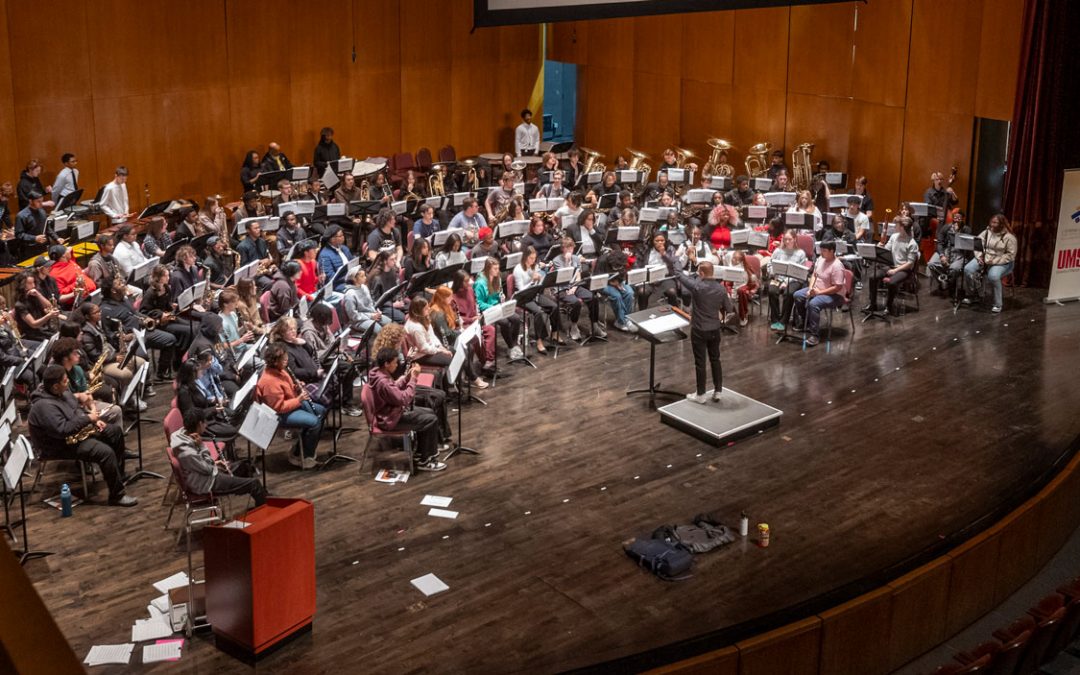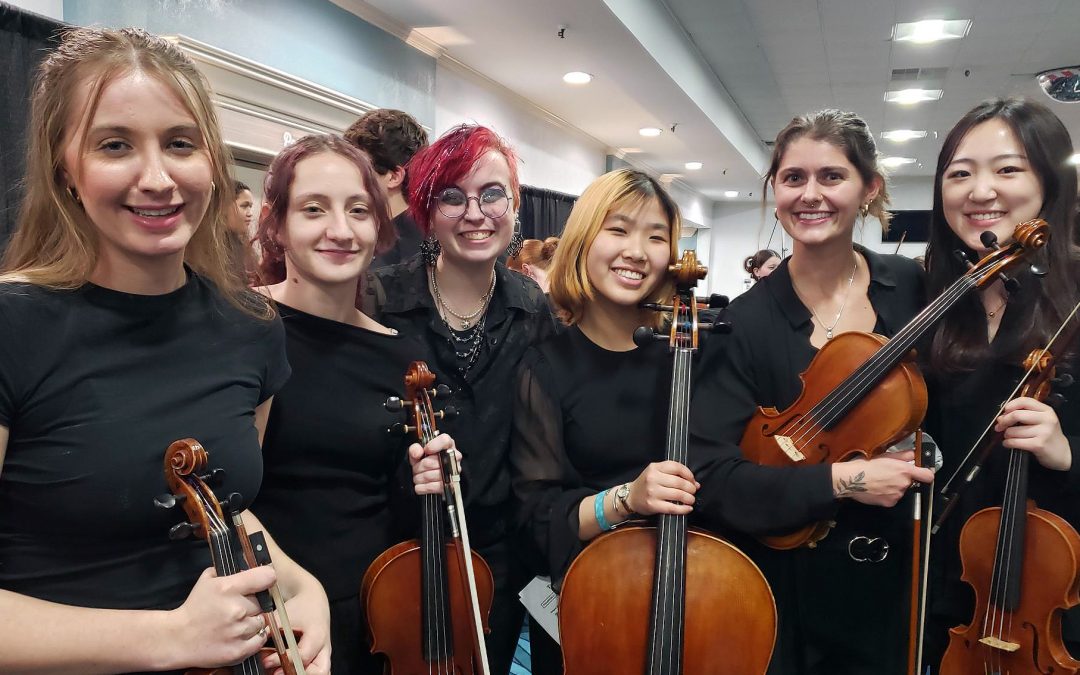
Shante Duncan, BA 2007, stands in the dining room entryway of the Joan B. Quinn Safe House, a home named after her great-grandmother. As the founder and executive director of S.H.E.R.A.H., she helps manage the facility and the nonprofit’s other growing programs. (Photos by August Jennewein)
At 8 o’clock on a miserably cold February morning, eight middle school girls shuffle into their school library one by one. The first student with a bright smile shouts a morning greeting as she walks in and pins her hair into a ponytail. Another arrives, leans her head on the center table and begins to explain that she’s coming down from a sugar rush caused by her morning breakfast.
After six others find unique routes to their seats, the girls make another round of individual introductions. They begin by affirming themselves – some touting their inner strengths, others their outer beauty – and end by saying something positive about the person sitting next to them, creating a space for empowerment and a community of sisterhood.
Such is the routine for L.O.V.E. Project instructor Shante Duncan four days a week in nine schools across the St. Louis region.
Duncan, a 2007 communication alumna of the University of Missouri–St. Louis, is the founder and executive director of the grassroots nonprofit S.H.E.R.A.H. – short for Sisters Helping Each Other Reach A Higher Height.
She started the organization in 2004 when she hosted a few old friends at her house for a night of bonding as she tried to navigate the end of an unhealthy relationship. Today, she’s expanded the simple fellowship group into a growing nonprofit that empowers a substantial number of St. Louisans through community sister circles, a safe house for women who have experienced complex trauma and an in-school educational program.
“When I started S.H.E.R.A.H., it wasn’t with the intention of me educating women about what it takes to be empowered. That was so far from my reality,” she says. “We started as an honest, safe space for women. We had no intention of being anything other than that. We were just trying to figure out how to become the best versions of ourselves.”
While that remains a major objective, Duncan’s vision for S.H.E.R.A.H. continues to evolve.
Her latest project – the Joan B. Quinn Safe House – opened in April 2018 as an eight-person residence that houses women who are recovering from sexual violence, transitioning out of incarceration or have experienced homelessness. The three-bedroom home, which was previously owned and renovated by Bill and Mary Neumann of Changing Lives Today, provides a free living space for the residents, who also receive food, clothes and other necessities.

Duncan relaxes in the bright, inviting entryway of the Joan B. Quinn Safe House. She opened the north St. Louis space in April 2018 for women who have experienced complex trauma.
Duncan had long hoped to establish such a space since she frequently opens her family home to women who reach out to S.H.E.R.A.H. for a safe place to stay.
In late 2017, Duncan received a text from a friend saying that the Neumanns were looking to sell their north St. Louis property to an organization with a similar mission. About 30 other agencies, including some of the largest in St. Louis, were interested in the space. Duncan didn’t think S.H.E.R.A.H.’s offer would stand up against the resources of these other organizations, but her husband urged her to submit a proposal to see if her vision for the home would align with the Neumanns’ hopes for the next owner.
A few weeks later, Duncan invested her family’s personal savings into purchasing the property, signed the paperwork and added an important accessory to her key ring.
“I got to a point where I was overwhelmed with telling women who needed a place to stay that I couldn’t help and giving them referrals to places that also couldn’t help them,” Duncan says. “Having that on my spirit was wearing me out. Now, the women are doing well, getting connected to life skills and have access to therapy. We always tell them that this is not a shelter. This is a home.”
Soon, she hopes to purchase other dilapidated buildings in north St. Louis to house additional women, create another safe house for minors who have experienced sexual violence and revitalize the neighborhood.
The origins of this passion date back to childhood. At 10, Duncan remembers walking past a vacant lot on her way home from school and offering a simple prayer: “God, if you can get me out of here, I promise I will come back and be a resource for people in my community.”
She’s done just that.
Meghan O’Donnell, a longtime friend of Duncan’s, was an early participant in S.H.E.R.A.H.’s sister circles, women’s networking groups that focus on a variety of topics such as business development, spirituality and parenthood. She was 18 at the time of her first meeting and struggling to find a sense of belonging after graduating from high school. Duncan and other attendees helped O’Donnell find a community and establish challenging but attainable goals for the next period of her life.
“When you hear about meditating and self-love it seems so foreign. But when I started joining the sister circles, I noticed that it kept me focused throughout the week and focused on my goals,” says O’Donnell who is now an on-air personality for Radio One St. Louis. “I was learning things about myself that I would have ignored otherwise. Shante really helped me learn to believe in myself. I’ve never had someone who is such a living resource.”
Duncan also serves as a resource to elementary, middle and high school girls across the region. S.H.E.R.A.H.’s in-school program – known as the L.O.V.E. Project – is focused on empowering girls of color between the ages of 9 and 17. The curriculum, which is written and delivered by Duncan, centers on four core areas: self-love, sisterhood, community development and entrepreneurship. She hopes the eight weeks spent on each of these principles will allow students to identify their talents and community projects they are passionate about while also overcoming issues and stereotypes specific to African American girls.
“I’ve made my own way, and I’m defining my own path,” she says. “My passion is to create a platform for more Shante Duncans from north St. Louis and for us to create the type of life that we want in our communities. I want to see us in a certain space. I always believe that it starts with women and girls. I believe if women can remember how powerful, amazing and beautiful we are and share that with our daughters, we can build up our community.”
This story was originally published in the spring 2019 issue of UMSL Magazine. If you have a story idea for UMSL Magazine, email magazine@umsl.edu.














